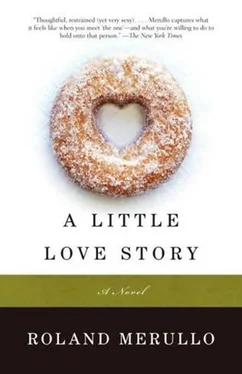“Hi,” I said. “Sorry to bother you, but have you noticed lately how much trouble there is in the world? Have you ever wondered why?”
ELLORY TOOK A STEP out of his hermitage and squeezed me so hard I thought the rib the governor had bruised was going to snap. Before I could breathe well enough again to introduce Janet, he said, “Either you’ve brought a beautiful woman with you or Brother Theodorus is playing dress-up again.”
“I’m Janet Rossi,” she said, holding out her hand.
“Sorry. I’m not allowed to shake hands with women.” Ellory stepped farther out from the hermitage and embraced her, too, though not as hard. “Come in, before the night watchman sees us and they turn me back into a Protestant.”
The hut was sixteen feet by sixteen feet with one chair, one table, one bed, one lamp, one three-shelf bookcase on the wall, a woodstove, a small sink with a hot plate to one side of it, a half-sized refrigerator, and a door that led to a closet with a flush toilet and a shower stall. I took the flashlight out of my pocket and Janet and I sat on the plain gray blanket on the bed. Ellory pulled his chair over. On his feet he was wearing a pair of no-heel leather slippers, color of a peanut shell, that my mother had given him when she was still, as we liked to say, “sharp.” They were in tatters, the tops and soles barely holding together, a toe showing through. Everything else in the room was perfectly neat-no cobwebs, no clutter, no excess-as if the monks had convinced my brother that the condition of his living space had some influence on the condition of his soul.
“Would you guys like me to call out for a pizza?” my brother offered. He paused one beat for effect, then went to the door, opened it, and, in a not very loud voice, sang out, “Pizza! Pizza!” He came back in and sat down, smiling like a kid in a swimming pool.
I could tell he was nervous.
Janet was watching him. “You have your brother’s sense of humor,” she said after a few seconds.
“It’s our dad’s, actually. He was an investment banker and then a financial counselor-did Jake tell you? White shirt and tie all week. Big serious meetings at which big serious men talked about large sums of money.”
“Big serious money,” I said.
“And at night, or on the weekends, or when we went someplace on vacation, he could be as foolish as a four-year-old.” He turned to me. His eyes were steady and clear. He was happy we’d come. “Remember Bastille Day?”
“We were on vacation in Paris,” I said to Janet, “and we were all sitting at a sidewalk table getting ready to have dinner.”
“Rue Mouffetard,” Ellory said. “No cars, you know. Little shops. Cobblestones.”
“And some guy with an accordion started playing lively French tunes. So my father grabbed my mother by the arm and pulled her out into the street and started dancing with her there, spinning her around, bending her backwards like Fred with Ginger.
“Which would have been fine, except he couldn’t dance to save his soul. He improvised. Mum improvised with him. It went on and on. The food was served, Mum came back to the table eventually, but Dad just kept going, solo. We started to eat and he just kept dancing, twirling around, flailing his arms up in the air. It really wasn’t that unusual a sight for us, him making a spectacle of himself. The people at the other tables loved it, though.”
“Mum loved it, too,” I said.
“Of course she did. She dealt with sick and dying kids all day, he was her relaxation… How is she anyway?”
“Okay. The same. Last time you saw her she was asking for me.”
Ellory almost smiled. “She’s not in any pain,” he said, and I could see the suit of guilt on him, too.
“She mixes us up,” I explained to Janet.
“You told me.”
We didn’t talk for a moment. Janet fussed with the top of her dress and pushed herself back on the bed so she was against the wall. She let her eyes wander over the sparse furnishings. Those sparse furnishings, I noticed for the first time, included a framed picture of a young woman, which sat on the top of Ellory’s bookcase, above a row of lentil soup cans and next to framed pictures of my sister, me, and our parents. I looked at it once, and then just focused on a corner of the room where my brother had set up a little shrine-crucifix, votive candle, a vase with a few stalks of some kind of wild berry in it.
I knew Janet well enough by then to see that she was at ease with Ellory and in his little house, the way she had been at ease in my apartment almost from the first minute. Families are like countries. They have their own language and jokes and secrets and assumptions about the right and wrong ways of doing things, and some of that always shows in the children, the way something of Germany or Australia always shows in a German or an Australian, no matter where they go. Outsiders like it or they don’t, they feel at home there or they don’t. It’s like the taste of cilantro. Giselle had never liked cilantro.
I had been thinking about the photograph and holding the bag with the sub sandwich and cigarettes in it. I was somehow not paying attention. After she’d finished looking at the pictures and the soup cans and reading the titles on the spines of Ellory’s books, Janet touched my arm and pointed to the oil stain on my pants. I handed the bag to my brother and told him what it was. He insisted we share the sandwich with him. We said no. He insisted again and we said no again, we’d just eaten, we were fine. And then he said okay but he would save half of it for the next day’s lunch. And then he ate the first half of the sub from a plate on his lap, with his bathrobe on and his hairy shins showing, in about three seconds. My eyes wandered up to the bookcase again, and I could not keep myself from thinking about something he had told me: that the monks in his order weren’t supposed to talk and so they learned sign language and there was a certain sign they used for greeting each other and it meant memento mori , remember death. When he’d first told that to me and for years afterwards I thought it was one of the worst things I’d heard about the monastery, right there in line with Pain is a blessing . “Remember life,” I thought they should be saying to each other. “Remember fun.”
But I’d gotten older and certain things had happened to me and to people close to me, and the monks’ little hand signal had started to make more sense. All of Ellory had started to make more sense.
I took the pack of cigarettes out of my shirt pocket and handed it over. He placed it on his desk, just so.
Janet pulled the top of her dress together again and asked him what it was like, living alone all the time.
In his early monastic days, Ellory would have said, “I’m not alone, I have the Lord’s presence,” or some special thing like that. But he’d grown up, finally, after thirteen years of no sex and no carousing and no sleeping later than four a.m. He looked up at her and said, “Oh, shit. You’ve been here all this time and I haven’t asked about you at all.”
“My life is an open book,” she said.
He smiled. He was still holding the dripping oily sandwich in both hands an inch above his plate. “Mine, too, but… What kind of work do you do?”
“I work for the governor of Massachusetts.”
“Doing what?”
“Reading and interpreting polls, deflecting and entertaining lobbyists, working on his travel itinerary in campaign years, advising on speeches, being a liaison with the press. Getting him reelected. My title is Special Assistant for Public Relations.”
“He must be a good man, then, if you work for him.”
“He’s a jerkoff,” I said. My hand was hurting more now; there was about two percent of being sorry left in me.
Читать дальше












